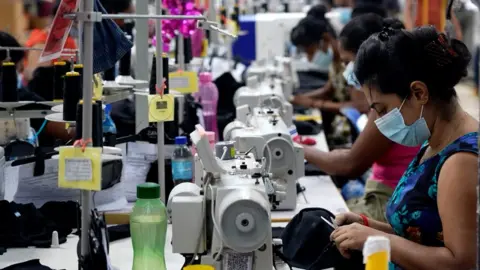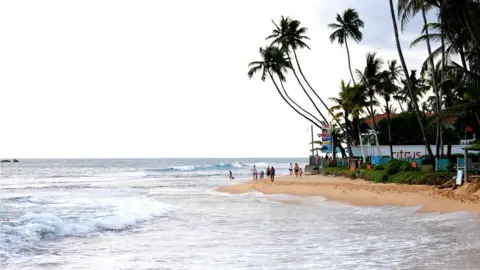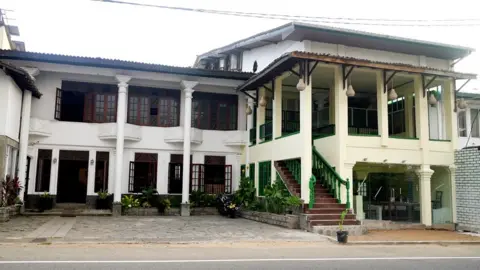Firms struggle amid Sri Lanka's economic crisis
 BBC
BBCIt is a daily struggle for Ranjith Koralage, the boss of a Sri Lankan clothing manufacturer, to find enough diesel to run his company's machines and steam rollers.
The chief of Kolonna Manufacturing, which is based in Sri Lanka's central province, has been running from station to station looking for 400 litres of fuel for the generator - just enough for one day.
With long power outages, interruptions have become the order of the day in factories across Sri Lanka. Thankfully, a generator brings power back up in some factories. But the fix is temporary with limited fuel.
Mr Koralage told the BBC: "Today we survived somehow, but I don't know about tomorrow."
His export unit makes knitted garments for Victoria's Secret, Puma and Levi's, and is among dozens of clothing factories struggling to meet production targets.
Garments are the second largest foreign exchange earner for the Sri Lankan economy. The sector had just recovered from the pandemic, with export earnings increasing by 22.1% to $514m (£393m) in January 2022 compared with a year ago.
Kolonna's order book is full for the next three to six months. But now disruptions are adding to existing worries around losing business to rivals in Indonesia, Bangladesh and Vietnam.
"If [the] government doesn't provide fuel we have to stop production, that affects customers' deliveries. Our clients are already asking us daily if we will be able to complete the orders in time or not," Mr Koralage says.
Sri Lanka is facing its worst financial crisis in decades, with foreign exchange reserves shrinking by more than 16% to $1.93bn in March, central bank data showed on Thursday.
Kolonna Manufacturing is a prime example of the model of economic development that Sri Lanka wanted: a factory in the island nation's hinterland that creates local jobs. It employs 800 workers, all from the region, including its chief executive Mr Koralage.
The unit makes garments for export and generates almost $140,000 a year for the local villages.
But it is now stuck in a vicious cycle. The dollar shortage has left the country struggling to pay for imports including food, medicine and fuel.
Even Sri Lanka's power plants are struggling to maintain operations. Long, rolling, power cuts are crippling businesses, especially export-oriented ones that are capable of earning the much-needed dollars.
Exporters like Kolonna typically lock in orders at fixed prices and have limited capacity to absorb rising costs. While a weaker Sri Lankan rupee benefits exporters, rising costs are draining all positives.
This affects both the business and its employees. Mr Koralage says as the cost of living goes up, retaining skilled workers will be another yet challenge.
Transport troubles
It's not just sewing machines that have to keep running. Workers also need to get to factories, something made more difficult with almost 50% of public transport not operating.
In the town of Embilipitiya, some 25km (15.5 miles) from Kolonna Manufacturing, the queues were along although the bus station was less busy than usual.
30-year-old Chathuri Dileeka, who works as an office assistant, had been waiting for over an hour. "Earlier I used to get a bus in 15 minutes, now I have to wait one to two hours. Sometimes the bus stops midway with no fuel," she told the BBC.
She has a motorcycle at home for shorter commutes but with petrol pumps running dry, even that now stands idle, she said.
A group of drivers waiting for their next customer say the number of journeys they have made on longer routes has fallen by a third.
Operators have stopped running buses on some less busy routes in order to ration the available fuel.
"[The] situation was not so bad even during Covid lockdowns. That was a crisis that the entire world faced, but this only we are suffering. I had never imagined a life like this, standing in fuel queues for days," a driver who has been been in the job for 20 years told the BBC. He did not want to be named.
Transport services had completely stopped last week when the government announced that it was closing down the supply of diesel for two days, due to offloading issues at ports.
Container trucks leaving the ports with essentials to be transported to the rest of the country are also waiting in kilometre-long queues for days, exasperating shortages.

Hard-hit hospitality
The beach town of Hikkaduwa, 130km south of Colombo, looks deserted. Once bustling with tourists from Europe and Middle East, the streets are now empty.
Nelaka Gunarathne opened his 30-room hotel to guests late last year after a three-year hiatus. After a six months of good business, Mr Gunarathne is faced once again with silent lobbies and empty rooms.
Tourists are leaving as hotels like his struggle to provide even the most basic services expected by guests.
Power cuts and shortages of essentials have hit hopes of a recovery, even for the tourism sector which is crucial to Sri Lankan economy. The industry collapsed during the pandemic, which was a key reason for the country's depleted foreign exchange reserves.
Most mid-sized and small-sized firms do not have a generator for back-up electricity as the country has not faced major power cuts in the past.
As it attempted to stop foreign currency leaving the country, Sri Lanka's government placed import restrictions on certain items.
That led to shortages and sudden price rises for essential foodstuffs including milk powder and rice. Headline inflation has risen to more than 17% in recent weeks, while food inflation is above 20%.
With even a cooking gas refills uncertain, restaurants are closed and hotels say retaining guests is a challenge. Mr Gunarathne said 80% of his bookings were cancelled between March and April.

"Guests have been calling to ask if the curfew will continue or will they get food? We really don't have answers for anything. When we are ourselves struggling to buy basic needs, how do we promise guests?" he said.
Sri Lanka became a popular tourist destination due to its pristine beaches and rich local culture. But now protests on the streets are casting a shadow over its image as a safe place to go on holiday.
The US State Department has raised its threat level and issued a level 3 travel advisory for American citizens against travel to Sri Lanka. India's largest airline Air India has reduced the number of flights to Sri Lanka due to lower demand.
What Sri Lanka needs now is economic and political stability to enable its factories to run smoothly and to bring tourists back to its shores.
